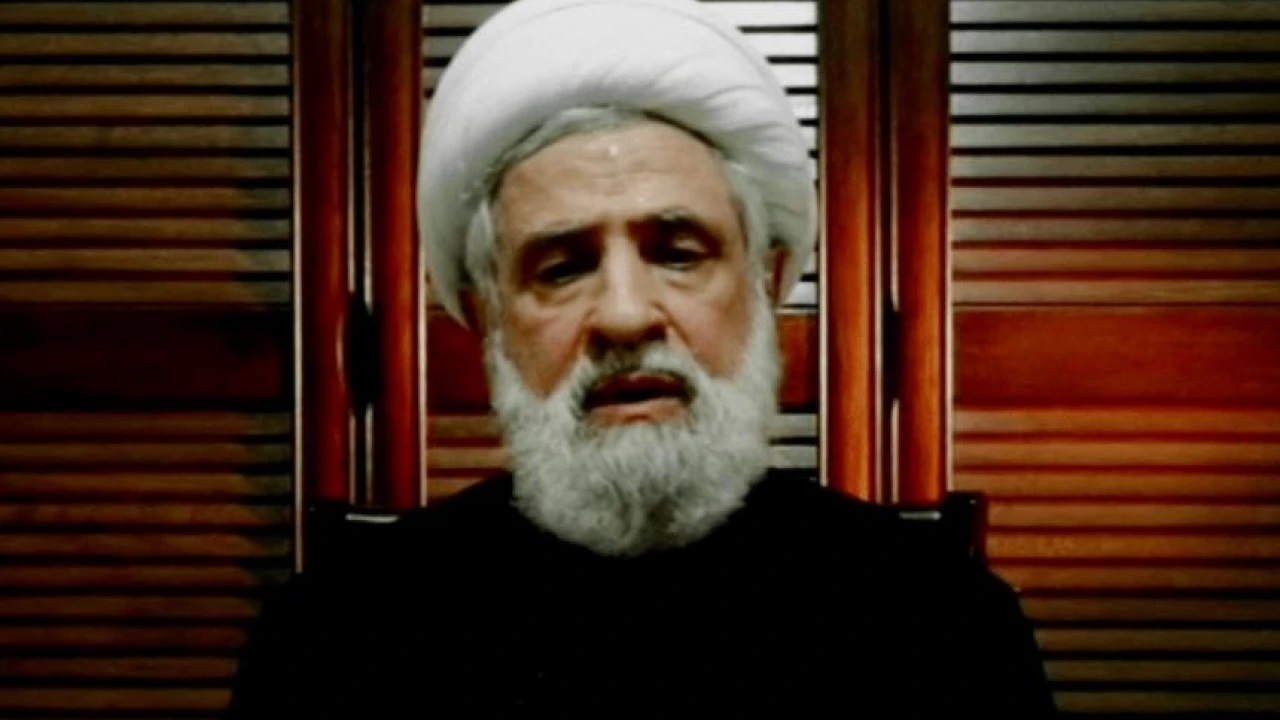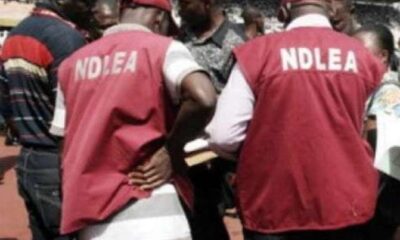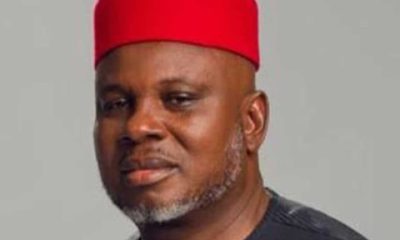Foreign
Hezbollah Vows To Keep Fighting Israel After Nasrallah Killing

Hezbollah vowed on Monday to keep fighting Israel and said it was ready to face any ground operation into Lebanon, after its leader was killed in an air strike that dealt the group a seismic blow.
In a televised address, the Iran-backed group’s deputy chief Naim Qassem said a new leader to replace Hassan Nasrallah, who enjoyed cult status among his supporters, would be selected “at the earliest opportunity”.
He also said the group was ready for any Israeli ground offensive, even though Israel’s bombardment of its strongholds has in the past week killed a large number of its top commanders and officials.
Hezbollah began low-intensity cross-border strikes on Israeli troops a day after its Palestinian ally Hamas staged its unprecedented attack on Israel on October 7, triggering war in the Gaza Strip.
Israel said earlier this month that it was shifting its focus from Gaza to securing its northern border with Lebanon, in order to allow Israelis displaced since October to return to their homes.
It has also not ruled out a ground offensive in order to achieve its goals.
Israel’s strikes on Lebanon have killed hundreds and forced hundreds of thousands more to flee their homes, and left people across the region fearful of more violence to come.
Qassem said Hezbollah would continue “confronting the Israeli enemy in support of Gaza and Palestine, in defence of Lebanon and its people, and in response to the assassinations and the killing of civilians”.
Warning that any battle with Israel would be long, he said: “We will face any scenario and we are ready if Israel decides to enter by land, the resistance forces are ready for any ground confrontation.”
On the other side of the border, Israel’s Defence Minister Yoav Gallant told troops: “The elimination of Nasrallah is an important step, but it is not the final one.”
“In order to ensure the return of Israel’s northern communities, we will employ all of our capabilities, and this includes you,” he said.
– Beirut strike –
Most of Israel’s strikes have targeted Hezbollah strongholds in eastern and southern Lebanon and the southern suburbs of Beirut, the group’s main bastion.
On Monday, a drone strike hit a building in the Cola district in central Beirut, with an armed Palestinian group saying it had killed three of its members.
The strike, the first in the centre of the city in years, sparked panic, with 41-year-old resident Mohammed al-Hoss saying “the kids were in shock” after his house was damaged.
“We are with Gaza and support the Palestinian cause, but our country cannot cope with us going to war,” he said.
“Our country is in a wretched state. They (Israel) finished with Gaza and they have come to Lebanon.”
Lebanon’s health ministry also reported the strike, saying it had killed four people and wounded four others. Israel has yet to comment.
Palestinian Islamist group Hamas later announced that its leader in Lebanon, Fatah Sharif Abu al-Amine, had been killed along with his wife and two children in another strike on Al-Bass refugee camp in south Lebanon.
The Israeli military confirmed it had “eliminated” Sharif in a strike.
Lebanon’s health ministry said six rescuers affiliated with Hezbollah were killed in an Israeli strike Monday.
Around Lebanon, Israeli strikes killed more than 100 people on Sunday, including 45 near the southern city of Sidon, according to the ministry.
Lebanon’s Health Minister Firass Abiad said Saturday that 1,030 people including 87 children had been killed since September 16.
UN refugee agency chief Filippo Grandi said “well over 200,000 people are displaced inside Lebanon”, while more than 100,000 have fled to neighbouring Syria.
Prime Minister Najib Mikati said up to one million people may have been uprooted, in potentially the “largest displacement movement” in Lebanon’s history.
– Yemen strikes –
The violence in Lebanon has raised fears of a much wider conflagration in the region.
On Monday, the Israeli army said it “successfully intercepted a suspicious aerial target that crossed from Lebanon into Israeli territory”.
Israel said it also carried out strikes on Sunday targeting Iran-backed Huthis in Yemen that the rebels said killed four people and wounded 33.
The raids in Yemen came a day after the Huthis said they launched a missile at Israel’s Ben Gurion airport, trying to hit it as Prime Minister Benjamin Netanyahu was returning from New York.
Iran has said Nasrallah’s killing would bring about Israel’s “destruction”, though the foreign ministry said Monday it would not deploy any fighters to confront Israel.
Lebanon began a three-day national mourning period for Nasrallah on Monday, with flags flying at half-mast.
In Israel, some had mixed feelings about the Hezbollah chief’s killing.
“Nasrallah was responsible for the deaths of many Israelis, so it is good news,” said Matan Sofer, 24, in the northern town of Rosh Pina.
“But do we risk it getting worse, who knows?”
– Calls for halt –
World leaders have called for a de-escalation.
French Foreign Minister Jean-Noel Barrot met with the Lebanese premier in Beirut Monday, and said his government sought “an immediate halt” in the strikes.
He is the first high-level foreign diplomat to visit since the Israeli strikes intensified.
US President Joe Biden, whose government is Israel’s top arms supplier, said Sunday a wider war “really has to be avoided”.
In Gaza, AFP journalists said the number of air strikes across the territory has dropped significantly in recent days.
Hamas’s unprecedented October 7 attack on Israel resulted in the deaths of 1,205 people, mostly civilians, according to an AFP tally based on Israeli official figures that include hostages killed in captivity.
Israel’s retaliatory military offensive has killed at least 41,615 people in Gaza, most of them civilians, according to figures provided by the Hamas-run territory’s health ministry. The UN has described the figures as reliable.
Foreign
US will ‘pass’ on Ukraine peace talks if no progress soon – Trump

Donald Trump said the US will “take a pass” on brokering further Russia-Ukraine war talks if Moscow or Kyiv “make it very difficult” to reach a peace deal.
The US president told reporters in the Oval Office on Friday that he was not expecting a truce to happen in “a specific number of days” but he wanted it done “quickly”.
His comments came hours after US Secretary of State Marco Rubio warned that the US would abandon talks “if it’s not going to happen”.
“We’re not going to continue with this endeavour for weeks and months on end,” Rubio said, adding that the US had “other priorities to focus on”.
When asked about the deal between Russian and Ukraine, Trump said: “We’re talking about here people dying. We’re going to get it stopped, ideally.
“Now if, for some reason, one of the two parties makes it very difficult, we’re just going to say, ‘You’re foolish, you’re fools, you’re horrible people,’ and we’re going to just take a pass.”
Russia launched a full-scale invasion of Ukraine in 2022 and has placed a number of conditions on any potential ceasefire.
Despite the Trump administration’s initial confidence that it could secure a deal quickly, attempts to reach a full ceasefire have yet to materialise, with Washington blaming both sides.
Following a meeting with European leaders in Paris about a potential ceasefire on Thursday, Rubio told reporters on Friday: “We need to determine very quickly now – and I’m talking about a matter of days – whether or not this is doable.”
“If it’s not going to happen, then we’re just going to move on,” he said about truce talks.
He said it was clear that a peace deal would be difficult to strike but there needed to be signs it could be done soon.
Trump had said before he re-entered office that he would stop the fighting in the first 24 hours of his presidency.
Kremlin spokesman Dmitry Peskov, when asked to respond to Trump saying he expected an answer from Russia on a ceasefire, said “the negotiations taking place are quite difficult”.
“The Russian side is striving to reach a peace settlement in this conflict, to ensure its own interests, and is open to dialogue,” he said.
The comments come as Russian strikes on Ukraine continue. On Friday, Ukrainian President Volodymyr Zelensky said in a post on X that Russia had launched a volley of missile attacks that killed two people.
During a meeting with Italian Prime Minister Giorgia Meloni in Rome on Friday, US Vice President JD Vance said he was “optimistic” about ending the Ukraine war.
“I want to update the prime minister on some of the negotiations between Russia, Ukraine, and also some of the things that have happened even in the past 24 hours,” he said.
“I won’t prejudge them, but we do feel optimistic that we can hopefully bring this war – this very brutal war – to a close.”
Vance’s comments followed separate news that Ukraine and the US took the first step towards striking a minerals deal, after an initial agreement was derailed when a February meeting between Trump and Zelensky erupted into a public shouting match.
On Thursday, the two countries signed a memorandum of intent stating that they intend to establish an investment fund for Ukraine’s reconstruction as part of an economic partnership agreement.
The aim is to finalise the deal by 26 April, the memo published by the Ukrainian government says.
The details of any deal remain unclear. Previous leaks have suggested the agreement has been extended beyond minerals to control of Ukraine’s energy infrastructure, as well as its oil and gas.
Ukrainian negotiators have tried to resist Trump’s demands that a joint investment fund would pay back the US for previous military aid, but have seemingly accepted his claim that it would help the country recover after the war ends.
The memo said the “American people desire to invest alongside the Ukrainian people in a free, sovereign and secure Ukraine”.
Zelensky had been hoping to use the deal to secure a US security guarantee in the event of a ceasefire deal, telling European leaders last month that “a ceasefire without security guarantees is dangerous for Ukraine”.
The US has so far resisted providing Kyiv with security guarantees.
The White House argues the mere presence of US businesses would put off Russia from further aggression, but that did not exactly work when they invaded in 2022.
Economy Minister Yulia Svyrydenko announced the signing of the memorandum on X, with pictures of Svyrydenko and US Treasury Secretary Scott Bessent separately signing the document over an online call.
“There is a lot to do, but the current pace and significant progress give reason to expect that the document will be very beneficial for both countries,” Svyrydenko wrote.
Bessent said the details were still being worked out but the deal is “substantially what we’d agreed on previously.”
Trump hinted at the deal during a press conference with Italian leader Giorgia Meloni, saying “we have a minerals deal which I guess is going to be signed on (next) Thursday…and I assume they’re going to live up to the deal. So we’ll see. But we have a deal on that.”
Ivanna Klympush-Tsintsadze, an MP and the chair of Ukraine’s parliamentary committee on EU Integration, told the BBC the Ukrainian Parliament will have “the last word” in the deal.
She added: “I hope that there will be enough reasoning to ensure that whatever is signed, and if it is going to be ratified that it is in the interest of our country and our people.
The memo release comes as a 30-day moratorium on striking Ukrainian energy infrastructure ordered by Russian President Vladimir Putin expires.
Peskov said Putin had not yet issued any new orders regarding the temporary ceasefire.
On Thursday, Ukraine’s Foreign Minister Andrii Sybiha met Rubio and Trump’s special envoy Steve Witkoff in Paris to discuss how to end the war.
Sybiha said they had “discussed the paths to a fair and lasting peace, including full ceasefire, multinational contingent, and security guarantees for Ukraine”.
Foreign
Trump To Close US Embassies In South Sudan, France, Others

The US State Department is expected to propose an unprecedented dismantling of Washington’s diplomatic reach, multiple news outlets reported Tuesday, shuttering programs and embassies worldwide to slash the budget by almost 50 percent.
The proposals, contained in an internal departmental memo said to be under serious discussion by senior officials, would eliminate almost all funding for international organizations, including the United Nations and NATO.
The document earmarks 10 embassies and 17 consulates for closure, including missions in Eritrea, Luxembourg, South Sudan and Malta, according to politics outlet Punchbowl News.
Five consulates earmarked for closure are in France while two are in Germany, Punchbowl reported. The list also includes missions in Scotland and Italy.
In Canada, US consulates in Montreal and Halifax would be downsized to “provide ‘last-mile’ diplomacy with minimal local support,” the website reported, citing the document.
Financial support for international peacekeeping would be curtailed, along with funding for educational and cultural exchanges like the Fulbright Program, one of the most prestigious US scholarships.
The plan comes with President Donald Trump pressing a broader assault on government spending, and a scaling back of America’s leading role on the international stage.
State Department spokeswoman Tammy Bruce downplayed the reports, telling journalists “there is no final plan, final budget, final dynamic.”
“That is up to the White House and the president of the United States as they continue to work on their budget plan and what they will submit to Congress,” Bruce said Tuesday.
She added that Secretary of State Marco Rubio had “reiterated our complete commitment to NATO, as has the president of the United States.”
The American Foreign Service Association called the proposed cuts “reckless and dangerous” while former US ambassador to Moscow Michael McFaul blasted a “giant gift to the Communist Party of China.”
The memo says the State Department will request a $28.4 billion budget in fiscal year 2026, beginning October 1 — $26 billion less than the 2025 figure, according to The New York Times.
Although it has little to say about humanitarian aid, programs tackling tropical disease, providing vaccines to children in developing nations and promoting maternal and child health would go, the Times reported.
The remnants of USAID — the sprawling development agency already crippled and eyed for closure by Trump and Musk — is assumed by the memo’s authors to have been fully absorbed into the State Department, said The Washington Post.
Only Congress — which the majority Republicans still need some Democratic votes to pass most laws — can authorize such cuts.
But the proposals will likely loom large in lawmakers’ negotiations over the 2026 budget.
Government departments were facing a deadline of this week to send the White House their plans for cuts, but the State Department has yet to make any public announcements.
It is not clear if Rubio has endorsed the April 10 memo, but he would need to sign off on any cuts before they could be considered by Congress.
US missions to international bodies such as the Organization for Economic Co-operation and Development and the UN’s children’s fund, UNICEF, would be merged with the diplomatic outposts in the city where they are located.
Rubio, meanwhile, wrote on X Tuesday that the State Department had canceled a further 139 grants worth $214 million for “misguided programs,” citing an anti-hate speech project in Britain as one example.
AFP
Foreign
Ukraine Accuses Russia Of Launching 2800 Aerial Bombs, Over 1400 Drones In 14 Days

Ukrainian President, Volodymyr Zelensky, has accused Russia of ongoing hostilities, stating that since the beginning of April, Russia has launched nearly 2,800 aerial bombs, over 1,400 Shahed drones, and approximately 60 missiles at Ukraine.
Zelensky’s statement, released on Monday, reads, “Currently, 38 people are receiving treatment inmedical facilities in Sumy following yesterday’s Russian ballistic strike — among them, 9 children. Eleven people, including 3 children, are in critical condition.”
“Every effort is being made to provide them with maximum assistance. Yesterday’s strike alone claimed 34 lives and left 119 people injured. Tragically, 2 children were killed, and another 15 were wounded.”
“Another 7 people were injured overnight in Odesa during a ‘Shahed’ drone attack. Last night, the Russians also struck Slovyansk, Uman, Kharkiv, Beryslav, and other cities and villages.”
“All the damaged sites are civilian: apartment buildings, stores, a car service station.”
“I thank all the services and everyone involved in rescuing people and defending lives. Russian terror continues every day and night. Since the beginning of April alone, the Russian army has used nearly 2800 aerial bombs, over 1400 attack drones — most of them ‘Shaheds’ — and nearly 60 missiles of various types, including ballistic ones.”
“Only real pressure on Russia can stop this. Tangible sanctions are needed against the sectors that finance Russia’s killing machine. The one who brought the war must be stopped and held accountable for what they have done; that is only fair,” Zelensky said.
In an earlier statement yesterday, Zelensky urged the world not to remain silent in the face of Russia’s continued aggression against Ukraine: “As of now, 31 people are known to have been killed in Sumy by the Russian ballistic missile strike. Among those killed were two children. My condolences to the families and loved ones… More than 84 people have been wounded, including 10 children. All of them are receiving the necessary assistance.”
“It is crucial that the world does not stay silent or indifferent. Russian strikes deserve nothing but condemnation. There must be pressure on Russia to end the war and guarantee security for people. Without truly strong pressure, without sufficient support for Ukraine, Russia will continue dragging this war out.”
Zelensky also accused Russia of rejecting a potential peace opportunity involving U.S. President Donald Trump.
“It’s now the second month that Putin has been ignoring the U.S. proposal for a full and unconditional ceasefire. Unfortunately, there in Moscow they are convinced they can keep killing with impunity. Action is needed to change this situation.”
World leaders have condemned the latest wave of Russian attacks and pledged solidarity with Ukraine.
On Saturday, top diplomats from Russia and Ukraine traded accusations over breaches of a tentative ceasefire agreement brokered by the United States. The deal aimed to halt attacks on critical energy infrastructure, signaling an attempt to ease tensions in the third year of the war.
However, Sunday’s strike underscored the fragility of such negotiations and the continued toll on Ukrainian civilians.
The war, which began with Russia’s full-scale invasion in February 2022, has resulted in tens of thousands of deaths and millions displaced, with no comprehensive peace agreement in sight.
International observers have raised concerns that the missile strike may constitute a violation of international humanitarian law.
Sumy, located near Ukraine’s northeastern border with Russia, has faced repeated assaults since the war began but had seen a relative lull in recent months. Sunday’s bombing marks one of the deadliest strikes in the region in over a year.
Ukrainian officials have called on allies to increase military aid and intensify sanctions on Russia, warning that continued attacks on civilian areas threaten any hope for a negotiated resolution to the war.
-

 News15 hours ago
News15 hours agoJust in: Many Feared Killed In Abuja
-

 News19 hours ago
News19 hours agoSenator Natasha on FB listed 3 politicians that should be arrested if anything happens to her
-

 News19 hours ago
News19 hours agoEmergency Rule: We should be thankful to President Tinubu -Wike
-

 News18 hours ago
News18 hours agoChina Reaffirms One-China Principle, Commend Support From Nigeria
-

 News15 hours ago
News15 hours agoPolice clarify on report alleging First Lady’s convoy killed 7-yr-old baby
-

 News13 hours ago
News13 hours agoAbuja raid attack: Three NDLEA officers sustain gunshot injuries, hospitalized
-

 News22 hours ago
News22 hours agoCourt Orders Fast-Tracked Trial Of 15 Workers Held In Prison For 6 Yrs Over Patience Jonathan’s Missing Jewellery
-

 News22 hours ago
News22 hours agoCatholic Church gives Anambra APC guber candidate rigid conditions for support






